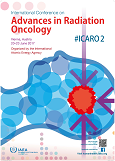Speaker
Francis HASFORD
(Ghana Atomic Energy Commission)
Description
Ghana has three functional radiotherapy centres serving a population of approximately 28 million. At present more than 7,000 new and follow-up patients suffering from a variety of cancerous and other degenerative diseases report to the three radiotherapy centres annually. Studies indicate that quality audits in radiotherapy helps to improve the quality of patient care and safety. In many developed countries, auditing in radiotherapy is well established, however in Africa, the reverse case is observed. There is evidence to suggest that diagnosis and treatment delivery improves not only for patients enrolled in a clinical trial with quality assurance (QA) programmes, but also for patients treated off-trial. Since development of a QA network programme is prone to require substantial human and financial resources, such activity is challenging especially for most medical institutions from less developed countries.
Ghana has implemented a National QA Audit programme for coordinated and sustainable audits of radiotherapy centres in the country. A team of medical physics auditors constituted locally were assembled and formed into groups to audit the three radiotherapy centres. The three centres are the Korle-Bu teaching Hospital, the Komfo Anokye Teaching Hospital and the Sweden Ghana Medical Centre. The IAEA loaned Ghana a CIRS Thorax Phantom for performance of end-to-end testing as part of the overall quality audit exercise. Audit teams visited the radiotherapy centres to conduct independent audit checks on the centres. Checks conducted in the radiotherapy centres include end-to-end tests, room entrance interlock, manual door opening, audio video monitor, beam on indicators, beam terminate switch, emergency off switches, beam indicators, touch guards, table locking brakes, deadman’s switches, tray, wedges, blocks and electron applicators. Also, mechanical and geometric test such as collimator rotation, gantry rotation, couch table were undertaken for system performance as well as output factor measurements.
Results from the audit exercises showed that the three radiotherapy centres were generally operating at desirable levels. In countries with properly structured dosimetry audits, significant improvement in patient safety and dosimetry has been recorded. Through the implementation of the quality audit programme in Ghana, it is being encouraged that regular and well coordinated auditing is made a requirement as part of a comprehensive quality management system in the country.
| Institution | Ghana Atomic Energy Commission |
|---|---|
| Country | Ghana |
Author
Francis HASFORD
(Ghana Atomic Energy Commission)
Co-authors
Edem Kwabla Sosu
(Ghana Atomic Energy Commission)
Eric Addison
(Komfo Anokye Teaching Hospital)
Evans Sasu
(Korle-Bu Teaching Hospital)
Francis Doughan
(Korle-Bu Teaching Hospital)
George Felix Acquah
(Sweden Ghana Medical Centre)
Mark Pokoo-Aikins
(Ghana Atomic Energy Commission)
Mary Boadu
(Ghana Atomic Energy Commission)
Osei Kareem Acheamfour
(Komfo Anokye Teaching Hospital)
Philip Oppong Kyeremeh
(Sweden Ghana Medical Centre)
Samuel Nii Adu Tagoe
(Korle-Bu Teaching Hospital)
Stephen Inkoom
(Ghana Atomic Energy Commission)
Theresa Bebaaku Dery
(Ghana Atomic Energy Commission)

